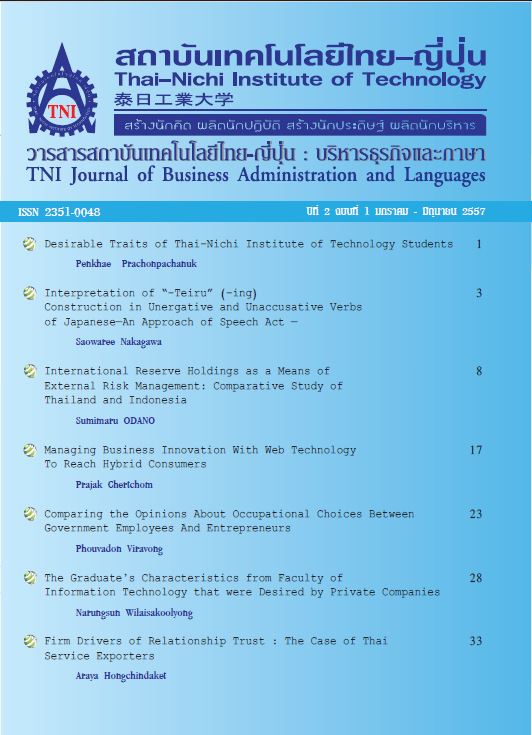Brand Alliance in Education : A Study of a Joint Degree Program between Asia-Pacific International University and La Sierra University
Main Article Content
Abstract
Due to high competition in Thailand's education industry, higher education institutions create new programs under international collaboration arrangement. Many studies have been focused on the antecedents of brand alliance evaluations in the view of tangible products. This research therefore intends to empirically investigate the impact of cross border education brand alliance. Building on several existing frameworks, it establishes self-brand connection as a new variable that influences consumer attitudes toward brand alliances, together with brand fit, brand knowledge, and attitude toward partner brands. In addition, this research also investigates the relationship between attitudes toward brand alliances and the intention to apply for the joint degree program.
Based on the data collected from 101 questionnaire respondents, a series was conducted. Three hypotheses, except for two in the model for this study, were sustained. The results replicate previous research findings and confirm that brand knowledge and brand fit influences consumer attitudes toward brand alliances. These attitudes toward brand alliances then predict intention to apply for the joint degree program, consistent with prior research. This research contributes to empirical validation of the international brand alliance in the education industry, thereby helping education institutions, adopt appropriate brand strategies and achieve real benefits of joint degree program.
Article Details
Article Accepting Policy
The editorial board of Thai-Nichi Institute of Technology is pleased to receive articles from lecturers and experts in the fields of business administration, languages, engineering and technology written in Thai or English. The academic work submitted for publication must not be published in any other publication before and must not be under consideration of other journal submissions. Therefore, those interested in participating in the dissemination of work and knowledge can submit their article to the editorial board for further submission to the screening committee to consider publishing in the journal. The articles that can be published include solely research articles. Interested persons can prepare their articles by reviewing recommendations for article authors.
Copyright infringement is solely the responsibility of the author(s) of the article. Articles that have been published must be screened and reviewed for quality from qualified experts approved by the editorial board.
The text that appears within each article published in this research journal is a personal opinion of each author, nothing related to Thai-Nichi Institute of Technology, and other faculty members in the institution in any way. Responsibilities and accuracy for the content of each article are owned by each author. If there is any mistake, each author will be responsible for his/her own article(s).
The editorial board reserves the right not to bring any content, views or comments of articles in the Journal of Thai-Nichi Institute of Technology to publish before receiving permission from the authorized author(s) in writing. The published work is the copyright of the Journal of Thai-Nichi Institute of Technology.
References
B. Helmig, J.-A. Huber, and P. Leeflang, "Explaining behavioural intentions toward co-branded products," Journal of Marketing Management, vol. 23, pp. 285-304, 2007
B. L. Simonin and J. A. Ruth, "Is a Company Known by the Company It Keeps? Assessing the Spillover Effects of Brand Alliances on Consumer Brand Attitudes," Journal of Marketing Research (JMR), vol. 35, pp. 30-42, 1998.
D. A. Aaker and K. L. Keller, "Consumer Evaluations of Brand Extensions," Journal of Marketing, vol. 54, pp. 27-41, 1990.
A. Besharat, "How co-branding versus brand extensions drive consumers' evaluations of new products: A brand equity approach," Industrial Marketing Management, vol. 39, pp. 1240-1249, 2010.
A. R. Rao, Q. Lu, and R. Ruekert, "Signaling Unobservable Product Quality Through a Brand Ally," Journal of Marketing Research (JMR), vol. 36, pp. 258-268, 1999.
L. Leuthesser, C. Kohli, and R. Suri, "Academic papers 2 +2 =5? A framework focusing co-branding to leverage a brand," Journal of Brand Management, vol. 11, p. 35, 2003.
A. R. Rao and R. W. Ruekert, "Brand Alliances as Signals of Product Quality," Sloan Management Review, vol. 36, pp. 87-97, Fall94 1994.
C. W. Park, S. Y. Jun, and A. D. Shocker, "Composite Branding Alliances: An Investigation of Extension and Feedback Effects," Journal of Marketing Research (JMR), vol. 33, pp. 453-466, 1996.
S. Dickinson and A. Barker, "Evaluations of branding alliances between non-profit and commercial brand partners: the transfer of affect," International Journal of Nonprofit & Voluntary Sector Marketing, vol. 12, pp. 75-89, 2007.
S. Spiggle, H. T. Nguyen, and M. Caravella, "More Than Fit: Brand Extension Authenticity," Journal of Marketing Research (JMR), vol. 49, pp. 967-983, 2012.
R. Batra, P. Lenk, and M. Wedel, "Brand Extension Strategy Planning: Empirical Estimation of BrandXCategory Personality Fit and Atypicality," Journal of Marketing Research (JMR), vol. 47, pp. 335-347, 2010.
I. Phau and K. C. Lau, "Brand personality and consumer selfexpression: Single or dual carriageway?," Journal of Brand Management, vol. 8, p. 428, 2001.
K. C. Lau and I. Phau, "Extending symbolic brands using their personality: Examining antecedents and implications towards brand image fit and brand dilution," Psychology & Marketing, vol. 24, pp. 421-444, 2007.
E. A. Yorkston, J. C. Nunes, and S. Matta, "The Malleable Brand: The Role of Implicit Theories in Evaluating Brand Extensions," Journal of Marketing, vol. 74, pp. 80-93, 2010.
J. E. Escalas and J. R. Bettman, "You Are What They Eat: The Influence of Reference Groups on Consumers' Connections to Brands," Journal of Consumer Psychology (Lawrence Erlbaum Associates), vol. 13, p. 339, 2003.
J. E. Escalas, "Narrative Processing: Building Consumer Connections to Brands," Journal of Consumer Psychology (Lawrence Erlbaum Associates), vol. 14, pp. 168-180, 2004.


